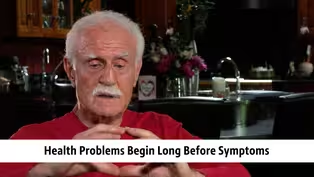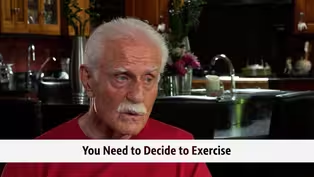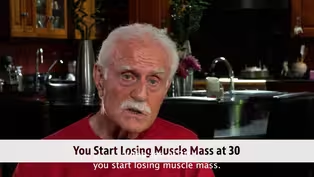KET Forums
When Medical Guidelines Cause Harm
Clip: Episode 29 | 5m 25sVideo has Closed Captions
Dr. Bryant Stamford discusses how medical guidelines can sometimes cause harm.
Dr. Bryant Stamford, professor of Kinesiology and Integrative Physiology at Hanover College, discusses how medical guidelines can sometimes cause harm.
Problems playing video? | Closed Captioning Feedback
Problems playing video? | Closed Captioning Feedback
KET Forums is a local public television program presented by KET
KET Forums
When Medical Guidelines Cause Harm
Clip: Episode 29 | 5m 25sVideo has Closed Captions
Dr. Bryant Stamford, professor of Kinesiology and Integrative Physiology at Hanover College, discusses how medical guidelines can sometimes cause harm.
Problems playing video? | Closed Captioning Feedback
How to Watch KET Forums
KET Forums is available to stream on pbs.org and the free PBS App, available on iPhone, Apple TV, Android TV, Android smartphones, Amazon Fire TV, Amazon Fire Tablet, Roku, Samsung Smart TV, and Vizio.
Providing Support for PBS.org
Learn Moreabout PBS online sponsorshipThe biggest problem is our communication with our doctor.
When you think about our medical guidelines, you think about it from this perspective.
We are told that a cholesterol level of 200 and below is healthy.
That's the guideline.
Where did that come from?
Well, years ago, when the Framingham Study Framingham Heart Study was started in 1948, we didn't know anything about heart disease.
And so basically people were just asked to.
They set up shop in Framingham, Massachusetts, set up a clinic, and they selected like 5200 people in town and asked them, Will you please come in every two years?
We're going to give you a really sophisticated medical workup and we don't want you to change a thing.
So over the next several years, we're going to follow you.
And let's say Joe has a heart attack and Pete doesn't.
Okay.
What is it about Joe that might have contributed to a heart attack?
And what is it about Pete that he didn't?
All right.
So?
So they began to flesh out risk factors.
Oh, he smoked cigarets.
He doesn't.
He has high blood pressure.
He does.
He has high cholesterol.
So we didn't know any of these things were were related at all.
And so over time, we began to develop the risk factors that go along with with heart disease.
Okay.
So so basically, if you think about what we know about heart disease from Framingham, it's still going on since 1948 that a cholesterol level of 150 or lower is where the guidelines ought to be.
But when that recommendation came forth, big business interests stepped forward, big business and, you know, fast food industry and the lobbyists and so forth and said, no, no, no, we are not going to tell the American public that they have to lower their cholesterol below 150, because we're going to lose a lot of business.
Why don't we compromise?
That's that's too draconian because that would be too big of a cut for the American public.
How about a compromise?
Let's make a 200.
Now, just to put this into perspective, then I'll stop.
The average cholesterol level in this country is 205.
Okay?
We are experiencing the epidemic of heart disease in this country because of cholesterol and other factors.
If the average cholesterol level in this country is 205, how healthy does 200 appear to you?
It's pretty ridiculous.
So we have these guidelines for cholesterol for blood pressure.
All right.
So we know that if blood pressure 120 or below is healthy.
But and as I said, I've I've dealt with medical students.
So so the way the medical school model is predicated is that the poor doctor has to have guidelines when doing medicate because medication is what our medical model is all about.
We got these world beating medications.
So I need to know what level of medicate well that the medication usually is at that first stage of hypertension.
140 over 90 Here's healthy, 140 over 90 is clinically significant.
I mean, that's when I start to medicate you.
What about all this area in between?
So I go to the doctor and my blood pressure's 138 over 86.
I haven't reached the level where medications, so I'm told, well, you're doing okay.
Maybe your blood pressure running a little high.
We'll we'll keep an eye on it.
No, your blood pressure is killing you, but you haven't reached the level yet where I should medicate you.
So.
And I can't tell you how often, albeit a cocktail party or something.
And some some wife will come up to me and say, Dr. Stanford, please talk to my husband.
He's killing himself.
He gets up every night and he makes himself two baloney and whipped cream sandwiches.
And he's doing this and he's doing that and he's overweight.
And please, like, why do you think that I would have any influence on him?
Because I'm sure you're trying very hard to.
Right.
Well, invariably, what happens is she finally convinces him to get a checkup.
Okay?
She finally convinces him to get a checkup.
He goes to the doctor and his blood pressure is, you know, 138 over 86.
It's not reach that level of medication yet.
All right.
So in his mind, I'm fine.
Doctor didn't give me any medication.
The blood pressure is killing him.
All right?
His cholesterol level is 210.
All right.
Well, you know, 200 healthy to ten.
Come out.
I give him a break.
It's a little high twice.
So he walks out like the cork in the walk.
Right?
Hey, you know you're wrong.
You got me here.
I'm fine.
Healthy as a horse.
No, no, he's dying.
He's sprinting toward heart disease.
But the information you got from his doctor is totally misinterpreted.
He doesn't understand what the doctor is saying to him.
The doctor is saying, I'm your doctor.
I am standing in the wings.
When you have a problem, I'll help you when you have a heart attack.
I'm here for you, okay?
There's nothing about.
You know what?
I'm a little concerned about you because you're sprinting toward disaster.
No, never.
Never.
Video has Closed Captions
Clip: Ep29 | 2m 23s | Dr. Bryant Stamford discuss how exercise is a fountain of youth. (2m 23s)
Exercise Does Not Negate Poor Diet
Video has Closed Captions
Clip: Ep29 | 2m 30s | Dr. Bryant Stamford discusses how exercises does not negate poor diet choices. (2m 30s)
Exercise is Essential for Balance
Video has Closed Captions
Clip: Ep29 | 1m 6s | Dr. Bryant Stamford discusses how exercise is essential for balance. (1m 6s)
Exercise Keeps Your Brain Sharp
Video has Closed Captions
Clip: Ep29 | 3m 22s | Dr. Bryant Stamford discusses how exercise keeps your brain sharp. (3m 22s)
Functional Fitness Keeps You Mobile
Video has Closed Captions
Clip: Ep29 | 2m 56s | Dr. Bryant Stamford discusses how functional fitness keeps you mobile. (2m 56s)
Health Problems Begin Long Before Symptoms
Video has Closed Captions
Clip: Ep29 | 2m 41s | Dr. Bryant Stamford discusses how health problems begin long before symptoms start. (2m 41s)
If It's Difficult, Keep Doing It
Video has Closed Captions
Clip: Ep29 | 4m 38s | Dr. Bryant Stamford discusses why it is important to keep doing exercises that are difficult. (4m 38s)
Video has Closed Captions
Clip: Ep29 | 1m 39s | Dr. Bryant Stamford discusses why it is important to make your gym time count. (1m 39s)
Video has Closed Captions
Clip: Ep29 | 2m 58s | Dr. Bryant Stamford discusses the connection between mental health and exercise. (2m 58s)
Shortcomings of America's Medical Model
Video has Closed Captions
Clip: Ep29 | 2m 26s | Dr. Bryant Stamford discusses shortcomings of America's medical model. (2m 26s)
Simple Exercises for Retaining Strength
Video has Closed Captions
Clip: Ep29 | 2m 19s | Dr. Bryant Stamford discusses some simple exercise ideas that can help you retain strength. (2m 19s)
Video has Closed Captions
Clip: Ep29 | 2m 12s | Dr. Bryant Stamford discusses how walking is a brain exercise. (2m 12s)
Why Now is the Time to Change Your Lifestyle
Video has Closed Captions
Clip: Ep29 | 4m 34s | Dr. Bryant Stamford discusses why now is the time to change your lifestyle. (4m 34s)
You Need to Decide to Exercise
Video has Closed Captions
Clip: Ep29 | 5m 44s | Dr. Bryant Stamford discusses the importance of deciding to exercise. (5m 44s)
You Start Losing Muscle Mass at 30
Video has Closed Captions
Clip: Ep29 | 6m 55s | Dr. Bryant Stamford discusses how you start losing muscle mass at 30. (6m 55s)
Providing Support for PBS.org
Learn Moreabout PBS online sponsorship
- News and Public Affairs

Top journalists deliver compelling original analysis of the hour's headlines.

- News and Public Affairs

FRONTLINE is investigative journalism that questions, explains and changes our world.












Support for PBS provided by:
KET Forums is a local public television program presented by KET














